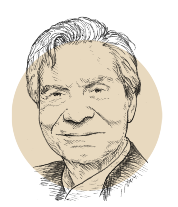Since the founding of the United States, the French and the Americans have constantly batted the ball of dominant ideas back and forth. Before going back to the origins, let us consider what is happening right now with the unfortunate controversy over abortion. The French response to the U.S. Supreme Court’s decision to reverse Roe v. Wade has been both strong and negative. French public opinion, which understands little of the complexity of federalism, concluded that abortion was now illegal in the United States. The fact is, of course, that the authority to regulate abortion has been returned to the states (it is illegal in thirteen of these at the moment, including eight that allow for no exceptions), since it is no longer a federally protected right under the Constitution. The French also have little idea how much evangelical churches influence conservatives and determine their votes.
Without bothering with such nuances, the French Parliament has asked that our Constitution now include the right to abortion, to avoid what is seen as the American contagion. No one in France truly contests abortion rights, apart from a few marginal groups, but the inclusion in the Constitution is a symbolic gesture and a proudly hostile reaction against the American right. Not on our watch, in the land of human rights! Another factor is that the fight against violence toward women is a priority of Emmanuel Macron’s term. This is to say that we, the French, are not Americans, and that the land of liberty is France and not the United States. This is the tendency of the dominant discourse in France, a stance that is subtly anti-American.
This episode draws our attention to a few equally significant events in our intermingled histories that go back to the genesis of our complex relationship. While the American Revolution was inspired by French philosophy (Rousseau and Montesquieu in particular) as well as by British ideas (especially from John Locke), the ideological drifting apart of our continents began as early as the storming of the Bastille and even more so during the Terror of 1793-1794. The earliest American leaders, George Washington, John Adams, and Thomas Jefferson, were enlightened aristocrats who were horrified by the populace and its violence. Only Thomas Paine showed enthusiasm for the French Revolution, until he was incarcerated in a Parisian prison.
Following on from these founding moments, French foreign policy has provoked great suspicion in America. Napoleon I’s seizing of American merchant ships, Charles X’s refusal to pay war reparations to the United States, Napoleon III’s sympathy with the Confederacy, the Third Republic’s failure to repay loans granted during World War I, the colonial wars in Indochina and Algeria, and the Suez expedition in 1956 to save the French empire were all deeply displeasing to Americans.
De Gaulle’s withdrawal from NATO military command in 1966, and Chirac’s refusal to join the alliance against Iraq in 2003 have further embittered a damaged relationship. What is surprising is that the French-American friendship has survived. This is probably because, at crucial moments, such as the Cuban missile crisis of 1962 or the attacks on the World Trade Center, France immediately aligned itself with the United States. “We are all Americans,” proclaimed Le Monde on September 13, 2001 – a sentiment shared by all the French.
In this eternal game of ping-pong, the French reflect the turmoil of American society. French republicans were inspired by American democracy when they fought against the imperial regime of Napoleon III. The Statue of Liberty was an initiative from these partisans of the Third Republic, led by the jurist Edouard Laboulaye. In the 1960s, the style of the Kennedys inspired the French political class to the point of caricature. Jean-Jacques Servan-Schreiber became JJSS and Valéry Giscard d’Estaing was nicknamed VGE. It is hard to imagine Charles de Gaulle going by CDG! We also adopted a kind of Reaganism à la française: Beginning in 1983, our leaders on both the left and the right were inspired directly by the economic models of American neoliberalism. There were even some French Trumpists. The Black Lives Matter and #MeToo movements were translated immediately into identical French versions.
To return to the beginning, it is abortion that now divides us, or, more precisely, distinguishes us. For we will never reach breaking point, nor will the French simply copy what happens in America. Emmanuel Macron’s recent visit to Washington D.C. illustrated this dividing line between our countries. Together, we are supporting Ukraine, but Macron and the French are more disposed than Joe Biden and the Americans to negotiate with Russia. And, to remind Americans that Paris will always be Paris, the fashion capital of the world, one notable figure in the French delegation was the CEO of Louis Vuitton, which designs Brigitte Macron’s wardrobe.
Editorial published in the January 2023 issue of France-Amérique. Subscribe to the magazine.












